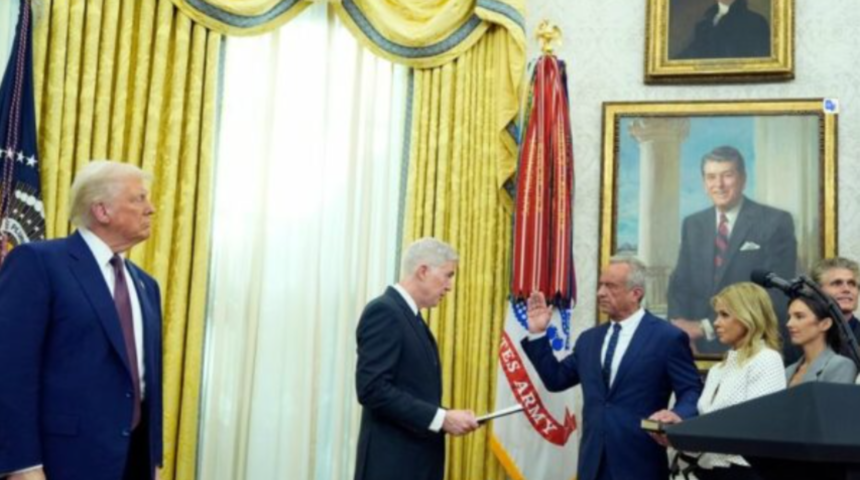Robert F. Kennedy Jr. was sworn in on Thursday as President Trump’s Secretary of Health, following a narrow vote in the Senate.
Earlier on Thursday, the U.S. Senate confirmed Kennedy Jr.’s nomination, despite his well-known stance as a vaccine critic, for the position of Secretary of Health and Human Services.
He received 52 votes in favor and 48 against. Senator Mitch McConnell from Kentucky was the only Republican to vote against him, joining the 47 Democrats who opposed Kennedy’s nomination.
Kennedy has pledged to protect existing vaccination programs while working to secure the votes of hesitant senators.
He is now expected to oversee several high-profile agencies, including the Centers for Disease Control and Prevention (CDC).
After Kennedy took the oath on Thursday, President Trump signed an executive order to establish a commission called MAHA, named after the slogan “Make America Healthy Again.”
As announced by White House spokesperson Karoline Leavitt to Fox News, Kennedy will guide the new Secretary of Health to “investigate the crisis of chronic diseases affecting our country.”
Kennedy, 71, an attorney specializing in environmental issues, has long cast doubt on the safety and effectiveness of vaccines that have helped curb diseases and prevent millions of deaths over the decades.
He will now lead a government department with a budget of over $3 trillion. The Department of Health also oversees the ‘Medicare’ and ‘Medicaid’ programs, providing health insurance to over 140 million Americans, as well as the National Institutes of Health (NIH).
Kennedy has stated that he wants to work on ending chronic diseases and severing any connections between employees of the regulatory drug agencies and the pharmaceutical industry. He will also push for agencies that provide water supply in the U.S. to remove fluoride from the water. His opponents have argued that he is not suited for this position due to his prominent role in the anti-vaccine movement.
His path to confirmation was filled with challenges, and it wasn’t always clear if he had the necessary votes among Republicans. He had to face his past as a member of the Democratic Party, his previous support for abortion, and his stance on vaccines. Some prominent members of his family, including his cousin Caroline Kennedy, publicly called for his disconfirmation.
Ultimately, Senate Republicans backed down from their objections, as they have done with every nominee of President Trump thus far.
After the Senate vote, Stephen Ubl, CEO of the Pharmaceutical Research and Manufacturers of America, the leading lobbying organization for the industry, said that pharmaceutical manufacturers are eager to work with the Trump administration to address the burden of chronic diseases, improve health outcomes, and make healthcare more affordable for Americans, as he stated in a statement.







